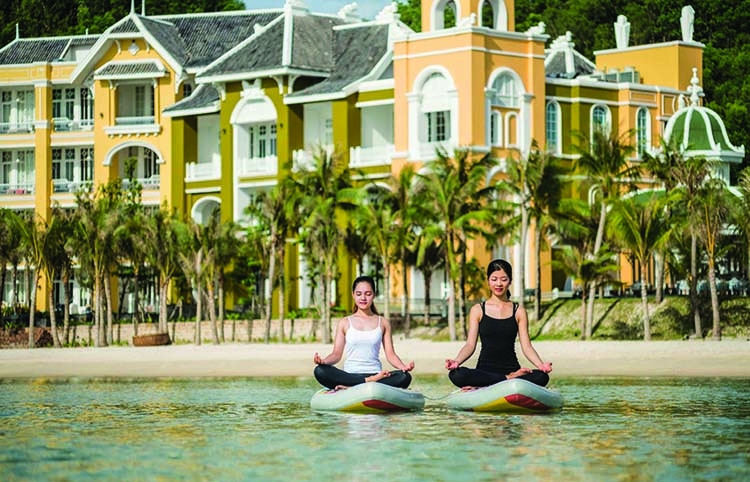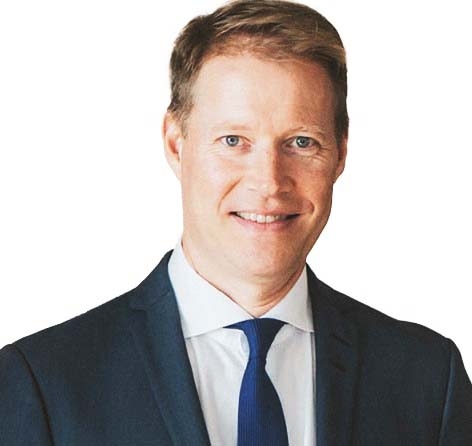Vietnamese tourism strives to reopen for business
 |
| Photo: JW Marriott Phu Quoc |
As private airline Bamboo Airways announced the suspension of commercial flights from July 26 to August 7, Vietjet and Pacific Airlines also suspended flights due to so few passengers travelling.
Vietjet, Bamboo, and Pacific airlines currently accounted for around 65 per cent of domestic market share in terms of the total number of flights operated in the first four months of the year, according to the Civil Aviation Authority of Vietnam.
The authority explained that although many routes have been suspended, airlines are still allowed to operate routes to localities that have not yet implemented the strictest anti-pandemic directives. But apart from Vietnam Airlines and Vasco, which continue to operate on some low-frequency routes, the remaining airlines are temporarily suspending operations as there are not enough customers to justify them.
The latest restrictions in hubs such as Hanoi and Ho Chi Minh City are seriously affecting the hopes of reopening Vietnam's tourism industry soon, both in an international and domestic sense.
In early July, the government asked the Ministry of Culture, Sports, and Tourism to coordinate with the People's Committee of Kien Giang province to develop a pilot route to welcome vaccinated international tourists to Phu Quoc, focusing on Russian people first. If successful, the Phu Quoc sandbox model could have been replicated in a number of destinations such as Con Dao, Danang, Cat Ba Island, or Nha Trang.
However, the spread of the Delta variant since the beginning of June has forced more than 20 provinces and cities in Vietnam into new measures. and as a knock-on effect, leaving little chance of Phu Quoc being able to welcome foreigners in the next few months. When asked if Vietnam can welcome international tourists in October as hoped, the common opinion of representatives of travel businesses AZA Travel, Images Travel, and Travelogy Travel is that the situation simply cannot yet be predicted.
Like many other tourism businesses in Vietnam, these enterprises have previously supported the pilot plan to welcome vaccinated international tourists.
Although they once shared that some foreign partners began to ask about services, procedures, and tour prices to build a programme, now the same partners are unsure about bringing visitors to Vietnam, with the number of infections in the community remaining high throughout July.
Concerns of tourism and travel businesses have not yet been addressed by the Vietnam National Administration of Tourism or the Ministry of Culture, Sports and Tourism (MoSCT) . However, Kien Giang province is still determined to push ahead with plans to welcome new tourists as soon as possible.
Bui Quoc Thai, director of the Kien Giang Department of Tourism explained, "The preparation of necessary procedures is being urgently implemented. When vaccination of the entire population on Phu Quoc is complete, the island can welcome Russian guests perhaps in October," Thai insisted.
Thai added that there is currently only one resort complex in the north of the island participating in the project. The pilot was set up to welcome 25,000-40,000 international visitors within six months, divided into two phases.
The Ministry of Transport (MoT) at the end of July agreed with the draft contents and suggested that international tourists could enter via charter flights or regular international flights when conditions allow.
The plan to handle guests who are refused entry, including ensuring isolation space for passengers who are refused entry while waiting for exit, is also being proposed and looked over by the MoT, MoSCT, and the People's Committee of Kien Giang province to study and put into the plan.
Recently, the Ministry of Health (MoH) also required medical units to issue and track the number of COVID-19 vaccination certificates for people with digital signatures, ensuring that each person has a QR code with full information. This is aimed towards "issuing internationally accepted vaccine passports to people and authenticating foreign vaccine passports entering Vietnam,” said the MoH.
According to some experts, the reopening plan of Vietnam's tourism industry still has a chance of success, but only if the next two months sees a dramatic improvement in efforts to control the pandemic across the south of the country in particular. Phu Quoc itself also remains a safe destination and will be prepared in a quicker timeframe than other previously popular tourist destinations.
However, in order for the plan to go smoothly, Phu Quoc and other potential sandbox models in Vietnam will have to find a way to solve immediate problems such as shortages of personnel, low service quality, and lack of new tourism products while ensuring safety for visitors and preventing disease from spreading in the community.
“There are high hopes for so-called 'revenge hospitality' as vaccine rollouts progressively permit borders to reopen. In the US, hoteliers are struggling under the whiplash of high demand, and then patron’s expectations are also high. Vietnam is well positioned to absorb this return to normality shock,” said Matthew Powell, director of Savills Hanoi.
Along with Vietnam, many other countries in Southeast Asia are also determined to maintain plans to open tourism despite being immersed in new coronavirus waves.
The Thai tourist island of Phuket has maintained its opening programme despite having recorded more than 800 COVID-19 cases, mostly locals. Since its launch on July 1, the Phuket sandbox programme has welcomed nearly 8,000 visitors.
To prevent the outbreak from getting worse, the Phuket government temporarily closed pubs, bars, karaoke, and other similar entertainment venues from July 20 to August 2. Shopping centres and restaurants serving alcoholic beverages also close at 9pm. Partying and drinking on the beach, in parks, and in other public spaces are strictly prohibited.
The Tourism Authority of Thailand is trying to convince tourists that while the overall COVID-19 situation in Thailand is worsening, Phuket is still a safe place to visit.
The city-state of Singapore also announced that it will establish a travel corridor with a number of countries and regions that have COVID-19 under control. It will also allow fully vaccinated people to travel without isolation, or isolate at home, from September, when 80 per cent of the population is expected to be vaccinated.
In contrast, many countries with high vaccination rates in Europe such as France and Spain are having to tighten tourism activities and face the risk of losing the summer tourist season due to the dark shadow of the Delta variant causing a sharp increase in the number of people with COVID-19.
| Jakob Helgen, Area vice president for Thailand, Vietnam, Cambodia, and Myanmar at Marriott International, shared with Nhat Ha his ideas for brighter tourism prospects. How feasible is the new action plan of the Vietnamese government to shorten quarantine for fully-vaccinated visitors and open selected spots for international guests?
Marriott International would be fully supportive of such an initiative, as long as appropriate policies and procedures are in place to support it. In Thailand, the Phuket sandbox has been launched, which allows fully-vaccinated international travellers to visit the island without the need to quarantine upon arrival. We welcome this step from the Thai government and understand that this will soon be replicated in other parts of Thailand. In Vietnam, Phu Quoc would be the ideal place for this to be trialled, as it is a self-contained island destination with excellent infrastructure for international travellers. We hope to hear more positive updates on this scheme, and are confident that vaccination is a key measure, along with testing, mask-wearing, social distancing, and hygiene practices in minimising the spread of the coronavirus pandemic. It’s important to have a clear and coordinated international approach, and we urge governments to come together and move this forward to enable borders to reopen for tourism. What preparations have you made to welcome fully-vaccinated international guests and guarantee comfortable services and their safety? The safety of our guests and associates continues to be a top priority, and we work to ensure a safe environment where guests can stay with confidence, without sacrificing the core experience. Since the onset of the pandemic, we have introduced our Commitment to Clean, enhanced operating standards and protocols that leverage a council of experts and new technology. Above and beyond our health and safety standards, however, we also understand the importance of flexible policies in creating guest satisfaction and loyalty. The travel landscape remains uncertain, so our customers appreciate reservation and cancellation policies that offer greater security. Finally, we need to ensure that we comply with all necessary government regulations to enable the safe and smooth reopening of the country. |
What the stars mean:
★ Poor ★ ★ Promising ★★★ Good ★★★★ Very good ★★★★★ Exceptional
Related Contents
Latest News
More News
- Manila becomes a new check-in destination for Vietnamese youth (December 11, 2025 | 18:07)
- Vietjet launches mega year-end ticket promotion (December 10, 2025 | 11:33)
- Dalat leads Vietnam’s 2025 search trends (December 09, 2025 | 13:44)
- Vietnam welcomes record wave of international visitors (December 09, 2025 | 13:43)
- Vietjet launches daily Manila flights to celebrate year-end festive peak season (December 05, 2025 | 13:47)
- The destinations powering Vietnam’s festive season travel demand (December 04, 2025 | 18:33)
- Vietnam named among the world’s most exciting winter destinations (December 04, 2025 | 15:10)
- Phu Tho emerges as northern Vietnam’s new tourism hub (December 01, 2025 | 17:00)
- Vietjet completes Airbus A320/A321 updates ahead of deadline (December 01, 2025 | 09:49)
- Vietjet resumes Con Dao flights from early December (November 28, 2025 | 15:24)


 Tag:
Tag:



















 Mobile Version
Mobile Version